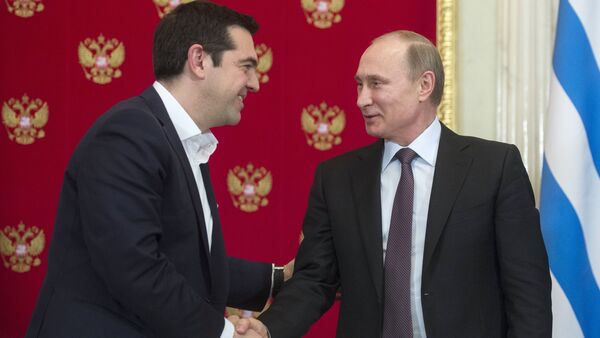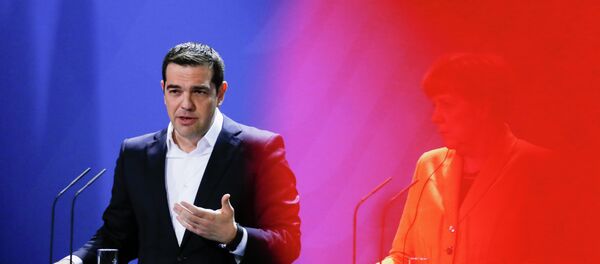Tsipras' decision to go to Moscow, amid his huge bailout battle with Europe should come as no surprise to historians. Most of the current Greek minority population in Russia comprises descendants of Medieval Greek refugees, from the Byzantine Empire, the Ottoman Balkans, and Pontic Greeks from the Empire of Trebizond and Eastern Anatolia.
Warmly received by the President & members of Greek expatriate community in Russia--a very heartfelt meeting. #Greece pic.twitter.com/46ba3ocBW8
— Alexis Tsipras (@tsipras_eu) April 8, 2015
Despite Tsipras being atheist, he is keen to play-up the Orthodox Christian bond between Greece and Russia, which will play well to the significant population of Greek descendants who make up large communities in Moscow and St Petersburg. He even laid a wreath at the Tomb of the Unknown Soldier.
In Moscow, honoring those who stood up to, and defeated fascism--a true victory of the people. #Greece pic.twitter.com/35V5OSqwBS
— Alexis Tsipras (@tsipras_eu) April 8, 2015
Having paid off its latest loan ($490m) to the International Monetary Fund on April 9, all eyes are on the next payment Greece will have to make every week in April and the further $7.75 billion it will have to find in May and June, while struggling to pay its own government staff and state pensions.
Greece Exit or Russian Sanctions?
By going to Moscow, Tsipras is playing a grand game. Germany's Angela Merkel is on record as having said a Greek Exit from the Euro would mean the end of the European dream. Many analysts believe a Grexit would consign the Euro to a less valuable currency, with countries able to pick and choose when and how they adopt it. It would devalue the brand.
At this morning's meeting w/@PutinRF_Eng we created a new foundation for Greek-Russian relations. #Greece
— Alexis Tsipras (@tsipras_eu) April 8, 2015
There have already been rumblings from some countries who are unhappy with the course of action against Russia over Ukraine and Crimea.
"We need to leave behind this vicious cycle," Tsipras told reporters.
"Greece is a sovereign country with an unquestionable right to implement a multi-dimensional foreign policy and exploit its geopolitical role."
Merkel is facing her own demons at home. She is aware of anti-Greek bailout sentiment on the streets and is also squeezed politically between the more conservative elements in the Christian Democratic Union (CDU) and the Eurosceptic Alternative for Germany (AfD) party.
News conference following talks with Prime Minister of #Greece Alexis Tsipras @atsipras http://t.co/2hCUiK5xWi pic.twitter.com/5XK0S5lA2I
— Vladimir Putin (@PutinRF_Eng) April 8, 2015
Under pressure to make Greece put an end to its culture of tax avoidance and reform its economy, Merkel is stuck between being seen to be tough on Greece and fearing the effect of a Grexit on the rest of Europe.
But in doing so, she will have lost face at home and been seen to bend to Greece.
"The visit could not have come at a better time," Putin told reporters during Tsipras' visit this week.




